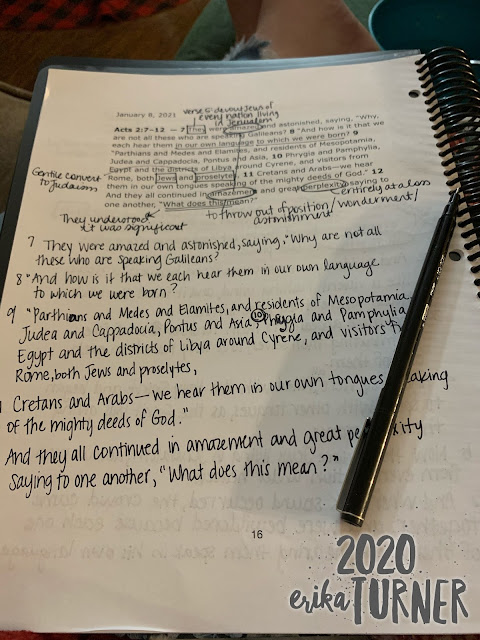A Language Teacher’s Thoughts on Acts 2
This year, I’ve been participating in a scripture writing study with ladies from congregations all around. It was created/designed by sister Carla Moore. (Check out her post and the download here! You can see some of my pictures below, but keep scrolling to read more...)
This week's reading had us focusing on the Day of Pentecost, the day of the birth of the church in Acts 2. One sister (Sheri Harris) posted something in our shared Facebook group about the clarity of "tongues" being "languages" after reflecting so closely on this passage. It doesn't mean an unintelligent collection of sounds and syllables, a mouthful of unrecognizable words. It means real languages that real humans used for real communication.
While this is knowledge that many of us may have grown up knowing, Sheri is right. This passage demonstrates the true definition of this word and reveals the misunderstanding of so many who -- ignorantly or intentionally -- pervert its meaning. So this week, I studied Acts 2 along with Genesis 11 (the account of the Tower of Babel, in which we see the introduction of languages). As an ESL teacher by trade, I wanted to expound upon what sister Sheri shared.
In every language, there are distinctions between what is considered “social language” and what is considered “academic language”. The first is what I might call “tailgate talk”. It includes our daily social greetings and culturally appropriate pleasantries that we exchange in daily interactions with others. Academic language is that technical jargon one would encounter in less superficial contexts: writing a business letter, interacting with your superior at work, studying for an exam, or pouring over the Scriptures even. It takes approximately 3-5 years to learn social English, meaning that if one of my kindergarten students came to me with no English proficiency whatsoever, he or she could reasonably be expected to speak fluently by second to fourth grade. (Remember: this is only conversational English! I won’t get into the layers of complexity involved in situations when we assume this means a child -- or adult for that matter -- is fluent enough for academic proficiency... but I digress.) Academic proficiency is typically achieved within 5-7 years, yet it can take even 10 years to achieve! This is with daily exposure, study, and support!
While these statistics are specific to English, I think we could all agree that it likely reflects the learning curve of probably every language. Including the ones represented on the Day of Pentecost! And yet, our God, through the Holy Spirit, enabled these apostles to intelligibly communicate the gospel itself through all the languages represented among the crowd that day!
The listeners knew this was something spectacular that they were observing. They said to one another in verse 12, "What does this mean?" The significance of the events unfolding was not lost on them. (Nor should it be on us today!)
And have you ever been in a situation where no one around you spoke “your language”? It’s lonely, and it can be frightening at worst and intimidating at best. The Greek word for “perplexity” in verse 12 appears to mean (or can mean) “entirely at a loss”, and I can’t help but think I would be at a complete loss too if one of my newcomer students just began speaking advanced English without a single hour of study! That's what's happening in this account. We know that the apostles' use of the language was so clear (through the Holy Spirit) that listeners understood the message that was being delivered clearly... we know because they heard it and obeyed without haste (Acts 2:37-41).
Of course, we understand that the age of miracles has ceased (1 Corinthians 13), but this account serves to reinforce how amazing our God is and how He used language as a powerful vehicle this day. The words these listeners heard spoken were the sweetest words anyone could hear in his or her own language: the message of salvation! As a language teacher, I think that’s a beautiful thing. ❤️





Comments
Post a Comment